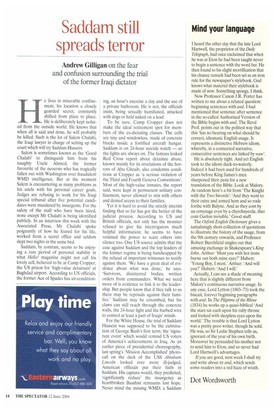Mind your language
I heard the other day that the late Lord Hartwell, the proprietor of the Daily Telegraph, had once exclaimed that when he was at Eton he had been taught never to begin a sentence with the word but. He then found to his slight mortification that his chance remark had been set as an iron rule for the newspaper's stylebook. God knows what material their stylebook is made of now. Something spongy, I think.
Now Professor Canon J.R. Porter has written to me about a related question: beginning sentences with and. I had mentioned that sentence after sentence in the so-called Authorised Version of the Bible begins with and. The Revd Prof. points out in the politest way that this 'has no bearing on what should be correct, idiomatic English usage. It represents a distinctive Hebrew idiom, whereby, in a connected narrative, consecutive sentences are linked by waw'.
He is absolutely right. And yet English took to the idiom duck-to-waterly. Indeed it had been used for hundreds of years before King James's men sharpened their pens for a new translation of the Bible. Look at Malory. At random here's a bit from 'The Knight with the Two Swords': 'And they went to their ostre and armed hem and so rode forthe with Balyne. And as they corn by an ermytage evyn by a chyrcheyerde, ther corn Garlon invisible.' Good stuff.
The Oxford English Dictionary gives a tantalisingly short collection of quotations to illustrate the history of the usage, from the 9th century onwards, and Professor Robert Burchfield singles out that amusing exchange in Shakespeare's King John. Arthur: 'Must you with hot irons burne out both mine eyes?' Hubert: 'Young Boy, I must.' Arthur: 'And will you?' Hubert: 'And I will.'
Actually, I can see a shade of meaning here that is slightly different from Malory's continuous narrative usage. In any case, Lord Lytton (1803-73) took the biscuit, forever beginning paragraphs with and. In The Pilgrims of the Rhine (1834) he works up a quasi-biblical 'And the stars sat each upon his ruby throne and looked with sleepless eyes upon the world.' The trouble is that Lord Lytton was a pretty poor writer, though he sold. He was, so Sir Leslie Stephen tells us, ignorant of the year of his own birth. Moreover he persuaded his mother not to send him to Eton, and so never had Lord Hartwell's advantages.
If you are good, next week I shall try and write about by and, which sends some readers into a red haze of wrath.
Dot Wordsworth


















































































 Previous page
Previous page